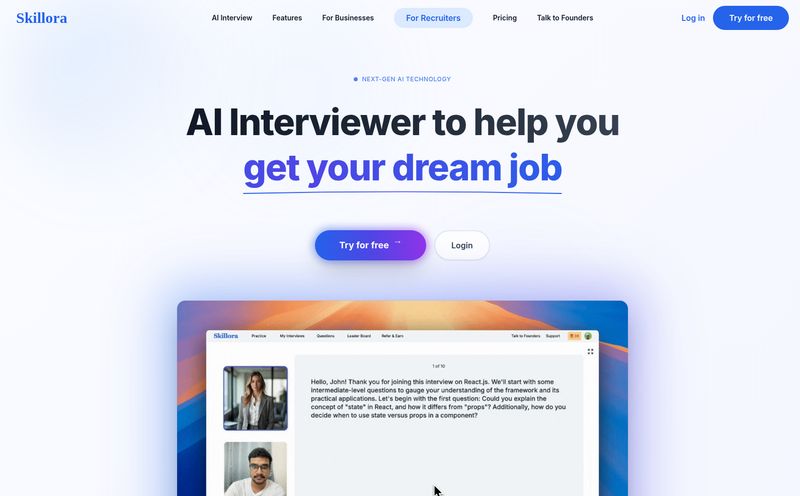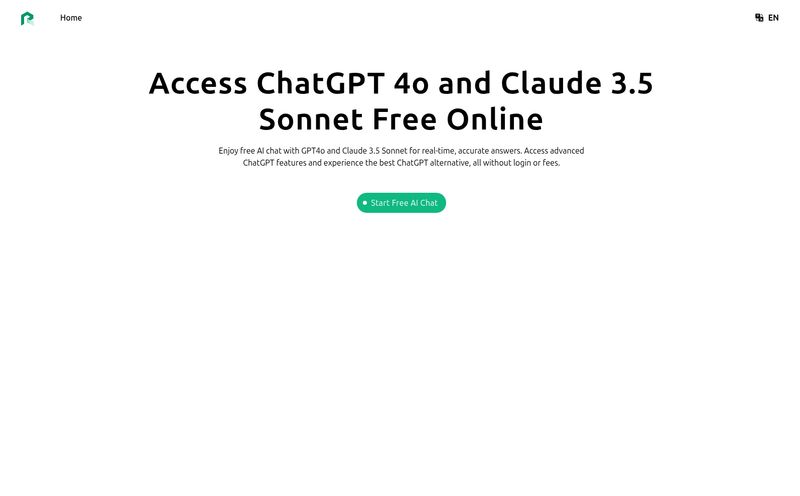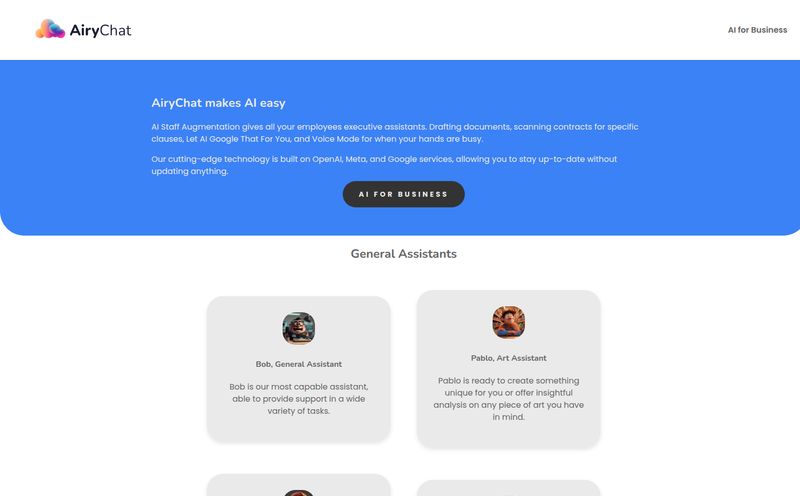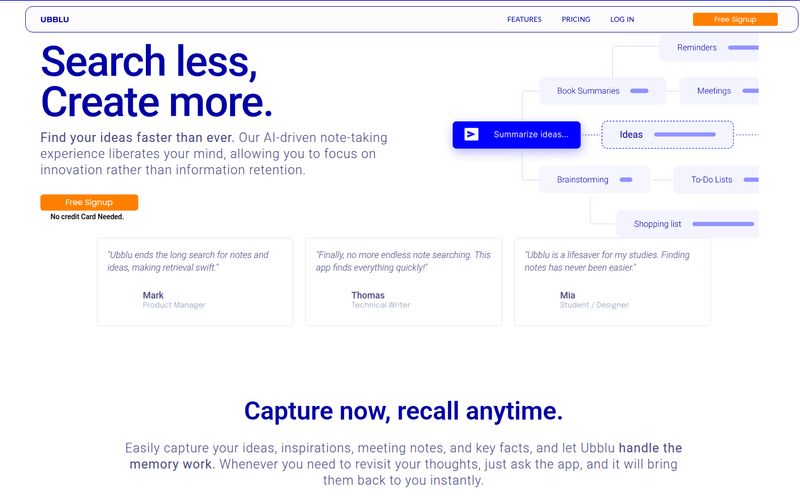I get it. We're all drowning in a sea of information. As someone who’s spent years watching digital trends, the current AI explosion feels like the Wild West all over again. Every day, a new tool pops up promising to organize our lives, write our emails, and maybe even do our laundry. And as a former student who remembers the sheer panic of finals week—surrounded by towers of textbooks and fueled by cheap coffee—the idea of an AI study buddy is more than just appealing. It’s the dream.
So, when I first heard about a platform called Syllabus.ai, my interest was piqued. The pitch was simple and brilliant: an AI-driven platform to generate notes, create personalized tests, and give you instant answers. It sounded like the ultimate cheat code for academic success. I had to see it for myself.
I typed in the address, ready to be wowed. And I was met with… a digital tombstone.
A stark, dark blue screen with a simple, brutal message: Buy this domain. For the low, low price of 690 USD. Well, that wasn't what I was expecting.
The Promise of Syllabus.ai: An AI Study Buddy?
Before we get to the post-mortem, let's talk about the dream. What was Syllabus.ai supposed to be? Based on the digital breadcrumbs it left behind, the concept was fantastic. You could upload your study materials—lecture notes, dense textbook chapters, research papers—and the AI would work its magic.
Imagine this: instead of spending hours highlighting and re-writing, an AI would instantly generate concise, easy-to-digest notes. It would pinpoint the most important concepts, saving you from the fluff. That alone would be a game-changer for anyone staring down a 500-page biology textbook. My college-self is weeping at the thought of what could have been.
But it didn't stop there. The platform also promised to create personalized test questions based on your specific materials. This is the holy grail of studying. It’s one thing to read notes, but true learning happens when you test your recall. Forcing your brain to retrieve information is how you build strong neural pathways. An AI that could generate an endless supply of relevant practice questions? Yes, please.
And to top it off, it offered instant AI-generated answers. Stuck on a concept? Confused by a question? You'd get immediate clarification. No more waiting for office hours or emailing a professor into the void. It was positioned as a 24/7 tutor, right in your browser.

Visit Syllabus.ai
So, Where Did It Go? The .online Ghost Town
Which brings us back to that sad little landing page. Seeing a promising startup's domain up for sale is the digital equivalent of finding an abandoned theme park. The rides are all there, but the lights are off and there's a definite creepy vibe. What happened here?
My mind immediately started racing through the possibilities, a habit from years of watching tech companies rise and fall. Did they run out of funding? The AI space is incredibly expensive, with API calls and server costs piling up fast. Maybe the burn rate was just too high. Or perhaps it was a solo project, and the developer got a great job offer at Google and decided to shelve it. It could have also been an idea that just… never fully launched. A great concept that got stuck in development hell until the domain registration simply lapsed.
This kind of thing is becoming more common in what I call the "AI Gold Rush." Everyone is rushing to stake a claim, and not all of them are going to pan out. For every successful ChatGPT or Midjourney, there are hundreds of little ghost towns like syllabusai.online. It's a stark reminder that a great idea is only about 10% of the equation; the other 90% is execution, funding, marketing, and a hell of a lot of luck.
Was the Idea Behind Syllabus.ai Actually Good?
Even though the platform is MIA, we can still analyze the concept. Was it a solid one? Absolutely. The core features are things students desperately need.
The strength lies in its targeted approach. AI-powered note generation is brilliant for tackling information overload. Creating personalized tests taps directly into effective learning science, like the principles of active recall and spaced repetition. And the instant-answer feature addresses the immediate need for clarification that so often stalls a study session.
Of course, it wouldn't have been perfect. The biggest challenge, which I see with AI tools all the time, is the quality of the output. The tool's effectiveness would have been completely dependent on the sophistication of its AI algorithms. A poorly trained model could generate inaccurate summaries or nonsensical questions, which is worse than no help at all. We've all seen AI get things hilariously wrong. You wouldn't want to base your final grade on an AI that thinks the mitochondria is the powerhouse of the… car.
Alternatives to Syllabus.ai You Can Actually Use
If you were excited by the promise of Syllabus.ai, don't despair! The spirit of the idea lives on in other, more stable, platforms. You just have to piece it together a bit.
For one, there's the old reliable: Quizlet. It's been around forever, but they've integrated some slick AI features recently, like "Magic Notes," which can turn your materials into outlines, flashcards, and practice tests. It's probably the closest you'll get to the all-in-one vision of Syllabus.ai.
Then, of course, there are the big players like ChatGPT or Claude. You can literally just paste in your notes and ask it to "summarize this," "create 10 multiple-choice questions from this text," or "explain this concept to me like I'm five." It requires a bit more manual prompting, but it's incredibly powerful and versatile. Think of it as a DIY Syllabus.ai.
And let's not forget platforms like Khan Academy. While not a tool for your specific class notes, its an incredible free resource for understanding core concepts in everything from calculus to art history, with plenty of practice exercises built right in.
The Bigger Picture: A Lesson from the AI Gold Rush
The story of Syllabus.ai isn't really about one failed platform. It's a cautionary tale for all of us navigating this new, exciting, and slightly chaotic tech landscape. It's easy to get swept up in the hype of a new tool. But before you integrate a new AI into your workflow or studies, do a quick health check. Is the company active on social media? Is there a clear pricing structure? Do they have a blog with recent posts? These are signs of life. A dead domain is, well, a pretty clear sign of the opposite.
The dream of a perfect AI assistant is getting closer every day. But for now, the path is littered with ghost towns. Tread carefully, and maybe stick with the tools that have proven they can at least afford to renew their domain name.
Frequently Asked Questions
What was Syllabus.ai supposed to be?
Syllabus.ai was pitched as an AI-powered study platform designed to help students prepare for exams. Its main features were to include generating notes from study materials, creating personalized practice tests, and providing instant, AI-generated answers to questions.
Is Syllabus.ai still active?
No. As of late 2023 and into 2024, the domain name syllabusai.online is listed for sale, indicating the platform is defunct or was never fully launched. It is not an active service.
Why do AI startups like this sometimes fail?
AI startups can face numerous challenges. High operating costs for servers and API access, intense competition, failure to find a product-market fit, or simply running out of funding are common reasons. Sometimes they are just side projects that get abandoned.
What are good, reliable AI tools for studying?
Great, stable alternatives include Quizlet (especially its AI-powered features), using large language models like ChatGPT or Claude for summarizing and question generation, and established educational platforms like Khan Academy for foundational learning.
Is it safe to use new AI study platforms?
You should be cautious. While many new platforms are innovative, some may not have robust privacy policies or could disappear unexpectedly. It's wise to avoid uploading sensitive personal information and perhaps wait for a platform to establish a track record before relying on it for critical tasks.
How much did the syllabusai.online domain cost?
The landing page for syllabusai.online listed the domain for sale with an asking price of 690 USD through the domain seller Sedo.
The Final Word
The tale of Syllabus.ai is a fascinating, if short, one. It represents a brilliant idea—a targeted solution to a universal problem for students. But it also serves as a potent reminder of the volatility in the tech world. For every tool that changes our lives, there's a ghost of one that could have been. The potential of AI in education is immense, and I'm still incredibly optimistic. We just might have to navigate a few more digital ruins to find the cities of gold.
Reference and Sources
- Quizlet: Online learning tool for flashcards and study games.
- Khan Academy: Non-profit educational organization with free learning resources.
- ChatGPT: AI chatbot developed by OpenAI.
- Sedo Domain Partners: The marketplace listing the syllabusai.online domain.



